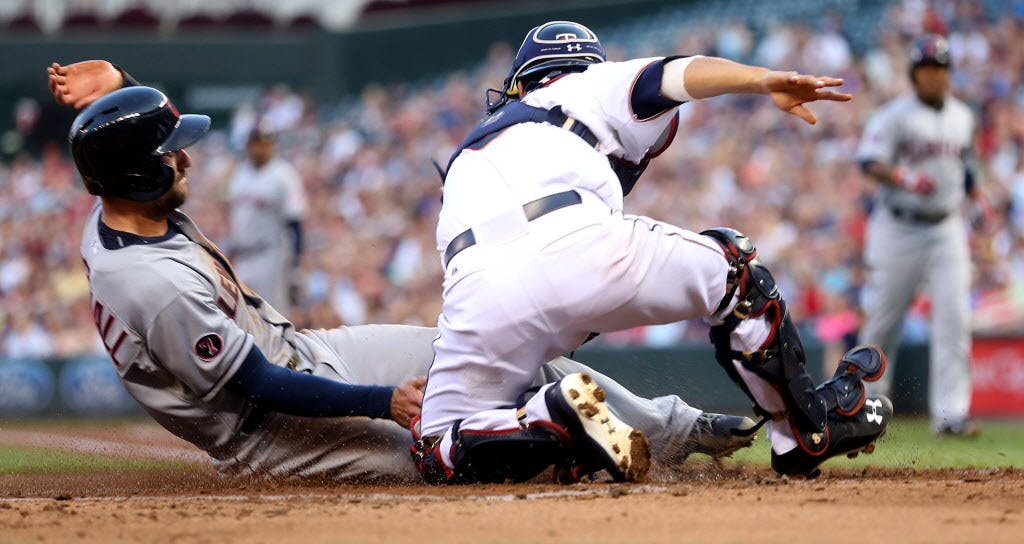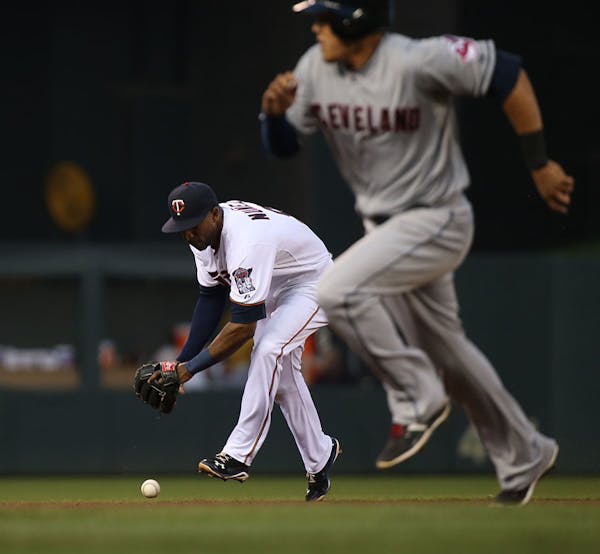Corey Kluber is not so tough. The Twins have ripped him for seven hits and scored four runs, and while that's not a lot of offense, it's enough to win a game, right?
Oh. Unless that's what he gives up over three games.
Paul Molitor suggested before Friday's game that the Twins were almost certain to have better luck against Kluber this time than they did Sunday, because "I don't think he could be much better." Thus challenged, Kluber was exactly that, tossing a nearly effortless one-hitter in a 6-1 Cleveland victory, facing only one more than the minimum 27 batters and needing only 98 pitches to do it. The domination wasn't quite as lopsided — the Indians won 8-1 Sunday — but Kluber seemed to be running on an endless video loop, retiring hitters over and over.
Bah, these summer reruns. The Twins are getting sick of them.
"All too familiar," Molitor said afterward, but he was wrong in at least one aspect: This game didn't have the sheer can-he-do-it tension of a no-hitter that his last outing possessed, mostly because Joe Mauer spoiled his perfection a little earlier this time. In April, Oswaldo Arcia broke up the no-hitter in the sixth with a single. Five days earlier, it was Mauer's two-out single in the seventh inning that halted Kluber's march to history. This time, Mauer took a Kluber slider in the fourth inning and crushed it 425 feet into the right-field stands, his eighth home run this season.
Hard to tell if Kluber was disappointed. Hard to tell if he noticed, actually, because he immediately resumed his metronomic destruction of the Twins, retiring the remaining 16 batters he faced, six of them on strikeouts.
If greatness can be monotonous, Kluber (8-12) has it perfected. The righthander with the biting curveball, the vicious slider and the unfailing ability to disrupt a hitter's timing now has pitched 26 innings against the Twins this season, and he has faced only three batters in 21 of them. He gave up three hits over eight innings in April, three hits in his complete game Sunday in Cleveland, and on Friday, he gave up a walk in second inning to Miguel Sano (then quickly erased him by inducing a double play from Trevor Plouffe) and Mauer's home run.
"My hopes were that maybe we could scratch something out early," Molitor said. "Kluber settles in and gets tougher as the game goes on. I don't think he was as sharp early as he had been in Cleveland, but he got zeroes."
The Twins couldn't, for a variety of reasons. Aaron Hicks misjudged a fly ball and let it sail over his head for a triple. Eduardo Nunez bobbled a ground ball that eventually led to a run. And Trevor May, making his first start since July 1, lasted three innings before his 50-pitch limit kicked in, but only two were scoreless. The second inning turned into a two-run inning when, two pitches after Hicks' misplay, May tried a changeup against Giovanny Urshela, and watched it disappear into the bullpen.
"You've got to make plays," Molitor said. "They come back to bite you, especially when a team's hot as Cleveland is."
He means, when a team is coming up fast from behind; the last-place Indians are now only 2½ games behind the Twins.
The Indians would have scored a couple of more runs but for Eddie Rosario's arm. The rookie outfielder threw out two more baserunners on Friday, giving him four in three days and 10 for the season, the fifth-most assists among AL outfielders. His play in the second inning was particularly amazing: Rosario ranged over to the left-field line to catch Jose Ramirez's one-out fly ball, then threw almost flat-footed to get Lonnie Chisenhall at the plate.
"I think that's his 55th assist when I'm pitching," May deadpanned. "I'm glad we've got guys with cannons out there. I've never seen a throw that perfect."
Sure he has. All you have to do is watch Corey Kluber pitch.

Live: Wild wrap regular season vs. Seattle, follow on Gameview
Kansas adds AJ Storr after he led Wisconsin in scoring this past season

How Edwards cooks up the Timberwolves' positive chemistry
Miami Marlins at Chicago Cubs game postponed because of rain in the forecast


